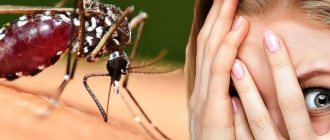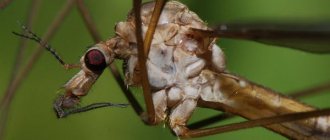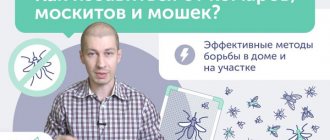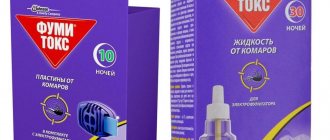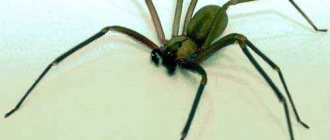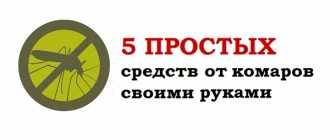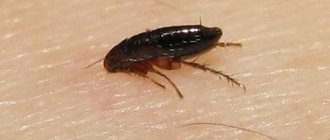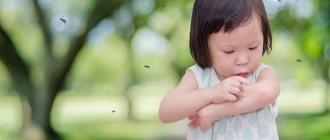Who are they - little bloodsuckers?
Mosquitoes belong to the family of dipterous insects.
All their representatives are characterized by oral organs, represented by the upper and lower lips, forming a sheath. It has 2 pairs of jaws in the form of thin needles. Males differ from females: their jaws are underdeveloped, so they cannot bite. There are about 3,000 species of mosquitoes on earth, of which 100 live in Russia. Blood-sucking insects are distributed throughout the world. But there are places where there are no mosquitoes at all.
It is the female that feeds on human blood. She is a carrier of infections and dangerous diseases. A mosquito evaluates the attractiveness of a human individual based on several “points.” Among them are the body's natural aroma, the presence of perfume and blood type.
The influence of climate on reproduction
Insects reproduce with the help of larvae. It is the female mosquitoes that bite humans, since they require blood during the egg production stage. In open nature, mosquitoes form a swarm in which mating occurs. The most comfortable temperature for this process is approximately 20 degrees.
Larvae and pupae, which develop from eggs laid by mosquitoes, live and develop in stagnant waters: puddles and swampy lakes. Mosquitoes that live in cities choose septic tanks or drainpipes to lay their larvae.
The condition of the reservoir also affects the development of larvae. Thus, some mosquitoes develop better in flowing waters saturated with oxygen, while others develop better in calm, heated bodies of water. It is for this reason that it is extremely difficult to find a place to relax where there are no mosquitoes.
Population Reproduction
The female mosquito is the successor of the family and is responsible for bearing and hatching the eggs. Male mosquitoes are only responsible for fertilizing the female.
Life cycle
The mosquito can hatch up to one hundred and fifty eggs in one go. In a week, they hatch into larvae, which go through four stages of development in a month and transform into a pupa, from which an adult insect is formed after five days.
An interesting fact is that insects are ready to mate immediately after emerging from the pupae. Males choose more mature females for fertilization.
Lifespan
How long does a mosquito live? Often, the lifespan of a mosquito depends on its living conditions. The answer to this question will always be different.
How long do mosquitoes live in an apartment? Until they are destroyed using special means or a firecracker.
The lifespan of a mosquito in nature is much longer. Biological studies reliably show how many days a mosquito lives. The air temperature indicator tends to fluctuate, but the life expectancy of an insect depends on its value:
- at + 25°C it lives from 30 to 40 days;
- at + 20°C – up to 60 days;
- at + 15°C – up to 115 days;
- at + 10°C - up to 120 days.
How do mosquitoes spend the winter? After all, for example, hatched individuals in October experience cold weather due to their lifespan.
In winter, mosquitoes can take root in people's apartments and warm basements. Where do they winter in natural conditions? Rotten stumps, remnants of vegetation - leaves, moss, various burrows and crevices where they hide help them survive the winter. They are, one might say, hibernating. Physiological processes in the body of a fertilized female slow down, and she lays eggs as the weather warms up. And with the onset of cold weather, males die for lack of a food source - nectar.
Nutrition
What do mosquitoes eat? The larvae have the opportunity to feed on particles of vegetation and microorganisms found in the water of the reservoir, which they pass through themselves. Adults survive on flower nectar. Then the question arises: why do mosquitoes drink the blood of humans and animals?
To bear and lay eggs, the female needs a lot of strength; nectar does not provide her with the necessary nutrients, while blood contributes to her complete saturation. This is why mosquitoes drink blood.
It should be noted that males do not bite, only females are voracious and in the moments after fertilization. The female mosquito sucks blood in order to gain strength and survive so that the population can continue to continue. If there is no source of blood nearby, then she dies after laying eggs, and her offspring are weak.
At one time, a mosquito can suck blood twice its weight, because the stretching abdomen is adapted to increase its size.
Are mosquitoes dangerous?
Scientists have identified more than 3,000 species of mosquitoes in the world. There are about 100 species of these annoying insects on the territory of the Russian Federation.
As such, the bites of mosquitoes that live with us in apartments or in nature cause virtually no harm. A bite can only cause an allergic reaction.
The danger of mosquitoes as a source of infectious diseases increases with changes in the climate zone. In the tropics and subtropics, mosquitoes can be carriers and carriers of diseases such as malaria, tularemia, West Nile virus, Zika virus, yellow fever, chikungunya, and dengue fever.
Types of mosquitoes living in Azov
You need to “know the enemy by sight,” so those planning to go on vacation to this region would do well to inquire what types of mosquitoes are most common in the Sea of Azov.
A local “attraction” is the so-called ringing mosquito (jerk or green mosquito). And in the literal sense of the word. In Berdyansk there is even a monument erected to this insect.
It turns out that the bell mosquito occupies an important place in the ecosystem. Its larvae - bloodworms, which live at the bottom of the local swamps, serve as excellent food for fish. But the main thing is that as a result of their activity they produce and leave in the mud many substances that have a beneficial effect on the human body.
One of the main features of this type of insect is the presence of underdeveloped oral organs. The bell mosquito does not feed on anything at all after it turns into an adult. It lives no more than a week, does not bite, is not a carrier of the disease and does not pose any danger to people. But with their specific ringing, which males emit to lure a female, they are capable of infuriating the calmest person.
In addition, multiplying in huge numbers, they fill everything around: they sit in the bushes, gather near the water, climb under clothes, climb into food. To get rid of an unwanted neighborhood, you have to take “radical” measures.
No matter how annoying these insects are, they will seem like just harmless mosquitoes compared to their gray “brothers”. This is who is the real scourge of the Azov and Black Seas! These mosquitoes appear in April-May and disappear only in September-October. During a season they are capable of producing from 1 to 3 generations of insects. Blood-sucking mosquitoes live everywhere; in search of a “victim” they travel dozens of kilometers.
Special sensors located on the antennae help the female find a suitable “object”. They are very sensitive both to ordinary thermal radiation that comes from living beings, and to products formed as a result of metabolism. For example, they can smell the smell of lactic acid, which is contained in sweat, 3(!) km away. It is impossible to outwit mosquitoes by using perfume or deodorant. And if it contains musk, it will further irritate and attract insects. That is why those who go on vacation should not use cosmetics and hygiene products with a strong odor.
Mosquitoes are big “gourmets”; they will not bite “just anyone.” Most of all they love blood of the 1st and 2nd groups, preferring to attack children, women and those who suffer from obesity and heart disease.
But this does not mean at all that if a person does not belong to these categories, then mosquitoes will fly around him. Under no circumstances should these insects be ignored, since they are carriers of many dangerous diseases - encephalitis, meningitis. Therefore, those who go on holiday to the sea, especially with children, should think about how to protect themselves from mosquitoes.
There is little point in hoping that such a problem can be avoided. There are practically no places where there are no mosquitoes on the Azov Sea. They are present everywhere in varying quantities. Their numbers may change depending on the weather, air temperature, and wind, but it is unlikely that it will be possible to wait until the moment when there is not a single mosquito nearby.
Mosquitoes in our area
Mosquitoes
Every year, with the onset of warm days, the population of our country thinks about how to protect themselves, their pets and their home from blood-sucking insects. There are no mosquitoes in Russia only in certain regions.
Most mosquitoes in the taiga are carriers of dangerous diseases. The abundance of insects is in the southern regions of the country, where temperature conditions are appropriate. In Moscow we have to fight parasites every year, and pests do not leave people living in St. Petersburg alone. It's all about the swampy area where the largest cities in Russia are located.
- There is no vileness in the central regions of the country.
- The problem does not exist in the Astrakhan region.
- Pests are found only near rivers in Cherepovets.
- In the Tver region there are mosquitoes, but there are no midges.
There are no parasites in the south of the Great Caucasus; they are found to varying degrees in other regions of the country. In Crimea, mosquitoes feel at ease, but there are areas of the peninsula where bloodsuckers are a rare occurrence. According to numerous reviews on forums where this issue is discussed, everything is learned by comparison. Some people think that there are no mosquitoes if they are not found in the apartment, others mean a relaxing holiday in nature.
Countries without mosquitoes
Pesky little blood-sucking creatures are quite annoying to most people in the warm season. To combat parasites, many different mosquito repellents and devices have been invented. But there are countries where there are no mosquitoes and midges. Experts attribute this fact to the lack of proper living conditions, but sometimes all requirements are met, and bloodsuckers are not encountered.
Countries without mosquitoes
Which country has no mosquitoes is something everyone who plans to spend a relaxing, bite-free holiday would like to know, going to various lovely places on the planet.
- There are no species of mosquitoes or mosquitoes in Iceland. The reason for this phenomenon has not been established. Experts suggest that insects are absent due to frequent climate changes - sudden alternations of cold in summer and thaw in winter.
- On the Fairy Islands, which are part of Denmark, you can also relax peacefully.
- The Teberda State Natural Biosphere Reserve attracts many tourists every year; it is surprising that there are no mosquitoes. The reserve is located in the Greater Caucasus. The main reason is the unsuitable mountainous terrain. There are no pests not only in the high mountains, but also in the lowlands. There are no bodies of water that insects need for reproduction and laying larvae.
- When choosing a trip to the sea, you can safely choose Turkey. There are few mosquitoes in this country. When the windows are open, blood-sucking parasites do not fly into the apartment. Near the sea, the breeze repels insects. However, mosquitoes are still found in Turkey.
- There are practically no insect data in Finland. Experts explain this by the lack of stagnant bodies of water in the country. Fast-flowing water does not allow insects to reproduce or lay eggs. Insects love wetlands.
Interesting!
Many people are surprised why there are no mosquitoes in Germany. The climate is quite satisfactory - constant dampness, warmth, many bodies of water, forests. This fact is explained by thorough sanitary treatment of wildlife from these insects. There is no country in the world that can compete with Germany in scrupulousness. There are no rubble, rotting trees, or abandoned reservoirs on the territory of this country. Thanks to the right actions of people, we achieved the desired result.
Regional affiliation
Mosquitoes inhabit various countries and regions, located in open areas with a warm and humid climate.
The mosquito is perhaps the only insect in the world that lives in any country and on any continent (except Antarctica). Russia is no exception - bloodsuckers plague beach lovers in every corner of our vast Motherland. There are mosquitoes in Crimea, Sochi, Anapa, and on the beaches in the Moscow region. They live in large numbers near rivers, swamps and stagnant bodies of water, so residents of Moscow and St. Petersburg are also susceptible to mosquito attacks.
However, it will also not be possible to hide from bloodsuckers abroad: mosquitoes “unfolded” vigorous activity in Greece, Cyprus, Abkhazia, Turkey - at all the resorts beloved by Russians.
Therefore, when going on vacation, do not forget about safety, because blood-sucking insects are known carriers of dangerous diseases.
A place where there are no mosquitoes in Russia - it exists!
Residents of our country will probably have a question about where in Russia there are no mosquitoes and midges. Due to climatic factors, they cannot be found only on snow-covered islands and on the coast of the Arctic Ocean, where the temperature never reaches the specified minimum of +10ۥC. Already a couple of hundred kilometers to the south, in the tundra, there are clouds of mosquitoes and midges. And even though their season is extremely short, no more than a month, bloodsuckers manage to cause a lot of trouble for reindeer herders. Insects can drink up to 300 ml of reindeer blood per day.
There are extremely few dipterans in the steppe and semi-desert zones of the Volgograd and Astrakhan regions, in Kalmykia. However, it is still impossible to call these regions areas where there are absolutely no ticks and mosquitoes. There are a lot of them in the lower reaches of the Volga.
Bloodsuckers are not found in the highlands of the Greater Caucasus Range - due to the low temperatures that always prevail at altitudes above 3000 meters above sea level.
However, in the Caucasus there is also a non-high mountain area where there is not a single species of mosquito. This is the valley of the Teberda River in Karachay-Cherkessia. The absence of insects is due to the unique local climate: the closed valley receives clean, cold and very dry mountain air all year round. Summer in the valley, despite intense insolation (2200 hours of sunshine per year), is always cool, which, coupled with the absence of sources of standing water, makes mosquito breeding, if not impossible, then extremely difficult. For 100 years now, the city of Teberda has been a center of balneological and climatic tourism and the only place in Russia where you will never hear the annoying mosquito singing.
Where in Russia there are no mosquitoes
Diptera insects, which include mosquitoes, are the oldest inhabitants of the planet. They appeared 400 million years ago, only cockroaches are older than them. During this time, they settled throughout the Earth with the exception of tiny uninhabited islands and Antarctica. In the immediate vicinity of the poles, the cold climate does not allow mosquitoes to breed. If the minimum daily temperature does not exceed +10°C, the mosquito's life cycle is impossible.
Free regions
Midges begin to plague people in our country in the spring. In mid-summer, when air temperatures rise above 25 degrees Celsius, activity decreases. Pests disappear completely in September at 10 degrees Celsius.
Most mosquitoes are in the taiga. Not only ordinary mosquitoes, but also malaria mosquitoes live there. Abundance is observed in the south of the country. Residents in Moscow and St. Petersburg suffer from small blood-sucking creatures. Every year, people protect themselves, their homes, and their pets with old and innovative means. The reason for the invasion is the swampy area and damp climate.
There are no mosquitoes in Russia only in a few regions.
- There is no vileness in the central cities of the country.
- Residents of the Astrakhan region are not attacked by bloodsuckers.
- In Cherepovets, Vologda Region, mosquitoes are found exclusively near rivers.
- The Tver region is unique in this sense. There are mosquitoes, but no midges.
The current method for controlling midges is not insecticides at all. Global measures are needed to drain wetlands. Stagnant bodies of water, large puddles, thickets, and old fallen trees contribute to the active reproduction of insects. In regions with a humid climate and fresh water bodies, pests are most numerous.
On a note!
Bloodsuckers have adapted to live in urban environments. Most of them live in basements and damp hallways. They rise to the upper floors when the elevator moves, through ventilation grilles.
A place where there are no mosquitoes in Russia - it exists!
Residents of our country will probably have a question about where in Russia there are no mosquitoes and midges. Due to climatic factors, they cannot be found only on snow-covered islands and on the coast of the Arctic Ocean, where the temperature never reaches the specified minimum of +10ۥC. Already a couple of hundred kilometers to the south, in the tundra, there are clouds of mosquitoes and midges. And even though their season is extremely short, no more than a month, bloodsuckers manage to cause a lot of trouble for reindeer herders. Insects can drink up to 300 ml of reindeer blood per day.
Why is there no malaria in Primorye?
Another interesting fact is related to the characteristics of Anopheles mosquitoes, carriers of malarial plasmodium. The largest number of species of this dangerous insect live in the tropics, however, in Russia you can also find 9 varieties of Anopheles. They are not found only in the Arctic and Eastern Siberia, where the climate is too harsh for pests. But in the humid climate of the Far East, malaria mosquitoes feel excellent. But, paradoxically, this cannot be said about the eternal companions of Anopheles - the parasites Plasmodium.
For reasons still unclear, these parasites do not survive in the dampness of the Far East. Therefore, no matter how hard the malaria mosquito tries in Primorye or in the Khabarovsk Territory, if it bites you with malaria, it will not infect you. True, the virus can easily transmit Japanese encephalitis and other dangerous infections.
Is winter to blame?
The development of mosquitoes is directly related to water, more precisely to small puddles and other forms of standing water that have been abundant since early spring. Above-zero temperatures also affected the overflow of many rivers and the swamping of coastal areas, creating favorable conditions for a massive invasion.
There were a lot of mosquitoes not only in swampy forest areas, but also in city basements. Therefore, the females, which had wintered favorably, actively began to reproduce and lay eggs.
The hot weather at the beginning of June took its toll; many mosquitoes found their way among people at once. De facto, we received an early and multiple invasion.
Are there mosquitoes in Iceland?
Iceland is home to 1,600 species of land animals. Despite this diversity, one species is missing! One of the positive things about Iceland is the absence of mosquitoes on the island. But is it? Are there other insects there? Let's figure it out.
There are really no mosquitoes in Iceland or not yet
Of course, Icelanders are very happy about this fact. Because these midges kill 830,000 people every year. True, such mass deaths occur mostly in Africa, South America, Central America, Mexico and Asia.
Many people wonder why there are no mosquitoes in Iceland (by the way, in the Faroe Islands either), but in the neighboring countries surrounding it there are? Even in Greenland there are two types of mosquitoes, 28 species are found in Norway, 28 species in the UK, and another 41 species can be found in neighboring countries east of Iceland. But why are there no mosquitoes in Iceland itself?
The reason for the absence of mosquitoes in Iceland probably lies in the special Icelandic conditions: “In Greenland and northern Scandinavia, the mosquito larva hibernates under the ice in winter and hatches from the egg as soon as the ice melts. This happens in the spring. But Icelandic winters are changeable.
In the middle of winter there may be a sudden increase in temperature with a thaw, then the temperature may drop significantly again. In such changing conditions, it is difficult for mosquito larvae to hatch. Climate change in Iceland is happening so quickly that the mosquito does not have enough time to complete its life cycle. Under these conditions, the larva simply does not mature. Therefore, there is not a single species of mosquito on the island.
Entomologist Erling Ólafsson believes that winter weather fluctuations are also not a likely explanation for the lack of mosquitoes. He says it's more likely the chemistry of the water and soil that plays a role. Midges and black flies exist in Iceland, especially in the Lake Mývatn area. Although they bite and some are even blood-sucking, they are not as dangerous as mosquitoes.
However, one mosquito made history in Iceland! In the 1980s, University of Iceland professor Gísli Már Gíslason discovered the insect on board an Icelandair plane and captured it for a sample. Today this mosquito is preserved in a test tube at the Icelandic Institute of National History.
Professor Gísli Már Gíslason.
Scientists concerned about global warming suggest that mosquitoes may one day appear in Iceland. Since the climate is changing towards warming, which will allow mosquito larvae to go through their entire life cycle.
But are there other insects in Iceland?
There are two types of midges in Iceland.
The first is rykmý (isl.), known as chironomids or bell mosquitoes, a family from the order Diptera. The mosquito got its name because of the characteristic sound that is produced due to the fact that the insect flaps its wings up to 1000 beats per second. Adults do not feed on anything; their oral organs are underdeveloped. They don't bite.
Chironomidae (Chiller mosquito)
The second - bitmý (simulium vittatum) - the largest genus of dipterans from the family of midges that breed in water bodies, since to lay eggs the female dives under water into fast-flowing streams and even waterfalls and is known to bite both people and animals.
Reasons for the absence of mosquitoes
Many travelers are interested in the question of whether it is true that mosquitoes do not live on the island. This is a scientifically proven fact, but the exact cause of this phenomenon has not been established. At the same time, in Greenland, Norway and all other surrounding countries there are a large number of blood-sucking insects.
Among the most likely reasons, experts highlight the country’s special climatic conditions. In Scandinavia or Greenland, the larvae of blood-sucking insects overwinter under the ice. In the spring, with the onset of warmth, the ice begins to melt, mosquito larvae hatch and begin active life.
The country's climatic conditions differ significantly from Scandinavian ones. Winters here are changeable; a sharp increase in air temperature in mid-January-February is often accompanied by a rapid decrease. This leads to disruption of the life cycle of parasites; after the Icelandic winter, the pupae do not survive.
The main reason for the absence of parasites on the island is considered to be sudden changes in weather
The country's climate changes are changing extremely quickly and rapidly, so the blood-sucking insect simply does not have time to complete its life cycle. As a result, the larva does not mature. That is why it is impossible to find a single species of mosquito here.
Other Possible Factors
There are other widespread theories according to which sudden changes in the island's climatic conditions are not the main reason for the absence of mosquitoes on its territory. Many entomologists believe that the fundamental factor is the special biochemical composition of the soil and water on the island.
This explains why there are no mosquitoes in Iceland, but there are black flies, black flies and some blood-sucking insects.
It is interesting that the only mosquito is still recorded in the history of the island. It was discovered in 1984 on board an Icelandair airliner and captured by entomologists. Today this insect is a specimen of the Institute of National History of Iceland.
According to the third theory, mosquitoes are absent on the island, but may appear soon. Due to global warming, the climatic conditions of Iceland are also changing, which will allow blood-sucking insects to fully survive their entire normal life cycle.
Many scientists attribute the absence of mosquitoes to the composition of the soil and water
Iceland is an amazingly beautiful, fascinating country that is completely mosquito-free. It is believed that the main reason for this is the special climatic conditions of the island. But, according to many scientists, global warming may cause the appearance of these blood-sucking parasites on the island.
Why there are no mosquitoes in Iceland
Gnus is the curse of the Arctic. The ubiquitous mosquitoes and midges, which fill all available space during the warm season, make life in northern latitudes simply unbearable. Taiga, forest-tundra and tundra are those landscapes where there is no escape from mosquitoes, and residents of Alaska, Canada, Taimyr, Yamal, Scandinavia, Greenland and many other regions are forced to spend the summer with these insects. Tourists who are forced to stock up on mosquito repellents when going to these places also suffer. But there is one curious exception to this rule - Iceland. If residents of this country know what mosquitoes are, it is only from educational films or tourist trips to other regions, because there are none in Iceland itself. Why are the conditions of the volcanic island not suitable for the ubiquitous insects?
Iceland, like all of the above countries and regions, lies within the Arctic climate zone, which is ideal for mosquitoes. It is not too hot here, and the vast wetlands with an abundance of shallow bodies of water create ideal breeding conditions for these insects in early summer. But these ideal conditions are spoiled by the specific temperature regime of the island.
The fact is that mosquitoes in Greenland or, for example, in neighboring Scandinavia spend the winter under a layer of ice in the form of a pupa. As soon as the ice melts and the summer season begins, the metamorphosis process is completed and adults are formed from the pupae, starting a new cycle of population reproduction. But winters in Iceland are very changeable. Due to the proximity of the Gulf Stream and its warm influence, thaws often occur here. At the same time, the Arctic reminds itself, returning negative temperatures and snowstorms to the island. These processes, replacing each other, occur throughout the winter. Mosquitoes probably reached these latitudes more than once, but could not complete their life cycle. The adult hatched during the thaw did not have time to leave offspring, as cold weather came again and the reservoirs necessary for the life of the larvae froze.
This is the reason why there are no mosquitoes in Iceland, and local residents are free from annoying insects that can also carry a number of dangerous diseases. And if in neighboring Greenland there are two species of mosquitoes, and in Norway, which has similar climatic conditions, there are as many as 28 species of mosquitoes, then Icelanders simply enjoy the summer without thinking about such a nuisance as mosquitoes.
Why there might be more mosquitoes in Iceland
According to experts from The New York Times, Iceland may lose its status as a “mosquito-free country” due to global warming. As already mentioned, the climate of the country is almost no different from the weather where insects feel great. In addition, there are enough reservoirs necessary for mosquito breeding.
But with increasing global warming, the situation may worsen. If it is the climate that really keeps mosquitoes away, then the island may lose its protection. Statistics show that this is quite possible: over the past 20 years, due to an increase in the average annual temperature, about 200 new species of insects have appeared in the country, which local residents have never heard of. And if warming continues, then Icelanders will most likely not be able to avoid mosquito infestations. However, scientists' theory may be wrong: if mosquitoes are repelled not by the climate, but by the chemical composition of the soil, then global warming will not play any role.
Countries without mosquitoes
Many do not believe that such places exist on the planet. It is known that insects do not like cold regions because they are unsuitable for their life and reproduction. So where in the world are there no mosquitoes?
- Antarctica is cold there all year round.
- Iceland - the exact reasons for the absence of small bloodsuckers in the country have not been established.
- Faroe Islands - due to the climate.
If the first point does not raise questions, then I would like to hear reasonable explanations for the second and third. Scientists are still figuring out the exact reasons for the absence of blood-sucking insects in Iceland. Today they put forward the following versions:
- A peculiarity of the Icelandic climate, which is characterized by frequent alternations of cold and heat.
- Chemical composition of the soil.
- Waters of the country.
Mosquitoes do not live on the Faroe Islands due to the peculiarities of the ocean climate (which scientists do not explain exactly).
Countries without mosquitoes In which country there are no mosquitoes, everyone who is planning to spend a relaxing holiday without bites, going to different pretty places on the planet, would like to know.
- There are no species of mosquitoes or mosquitoes in Iceland. The reason for this phenomenon has not been established. Experts suggest that insects are absent due to frequent climate changes - sudden alternations of cold in summer and thaw in winter.
- On the Fairy Islands, which are part of Denmark, you can also relax peacefully.
- The Teberda State Natural Biosphere Reserve attracts many tourists every year; it is surprising that there are no mosquitoes. The reserve is located in the Greater Caucasus. The main reason is the unsuitable mountainous terrain. There are no pests not only in the high mountains, but also in the lowlands. There are no bodies of water that insects need for reproduction and laying larvae.
- When choosing a trip to the sea, you can safely choose Turkey. There are few mosquitoes in this country. When the windows are open, blood-sucking parasites do not fly into the apartment. Near the sea, the breeze repels insects. However, mosquitoes are still found in Turkey.
- There are practically no insect data in Finland. Experts explain this by the lack of stagnant bodies of water in the country. Fast-flowing water does not allow insects to reproduce or lay eggs. Insects love wetlands.
We suggest you read: Dry nits - photos, how to get rid of them and whether there can be nits without lice
What a mosquito doesn't like
Iceland is a European country where there are no mosquitoes. But you shouldn’t go there just to enjoy the absence of these annoying insects. Let's find out the main factors that irritate and repel mosquitoes.
Little “vampires” prefer victims who are intoxicated. This is due to the peculiar smell that comes from their skin. Strong drinks make the human body warm, moisturized, and, in the summer, sticky. All these moments are very attractive to mosquitoes.
Blood-sucking insects do not like citrus aroma, dryness, or smoke. In places where there is a frequent concentration of mosquitoes, it is recommended to light a fire and have plants with a bitter citrus smell. Little “vampires” love water very much. They lay larvae near water sources. Therefore, dry places will not be attractive to them.
Where are there no mosquitoes yet? They are wary of places where picaridin is present. This is a synthetic compound that was developed from a plant that resembles hot peppers. It is added to preparations used to protect against mosquitoes. It keeps insects at a distance.
Danger is in the water
“When someone is abundant in an ecological system, it means they have favorable conditions. A large number of mosquitoes in the wild provide a good source of food for birds. But if there are no or few mosquitoes, then this is a bad sign. A sign that something is wrong in the ecosystem,” explained Dmitry Musolin.
He also said that mosquitoes are a nuisance where there is calm air. In the wind or in a space where there is air movement, they will not exist. Mosquitoes can be driven out of a confined space using various repellents, but only temporarily.
“Summer residents should try to ensure that there are no sources of standing water nearby, for example, barrels or tires. However, when planning to celebrate the May holidays outdoors, it is much more important to protect yourself from ticks than from mosquitoes. It’s worth getting vaccinated against encephalitis or using various deterrents,” the expert said.
In places where there may be ticks, you should wear long sleeves and tuck your pants into your socks. You can spray repellent on top. If a tick bites, a person must go to the emergency room or remove the insect themselves.
What happens if mosquitoes disappear
A mass extinction of flies on earth would be considered an environmental disaster. The complete disappearance of blood-sucking insects also poses a considerable danger. We know which country has no mosquitoes - Iceland. And the people living there do not face environmental problems. But this is the exception rather than the rule. If there were no mosquitoes on the ground, the following unpleasant moments would arise:
- Many species of fish have disappeared from the lakes.
- In reservoirs, the number of plants that feed on the larvae of blood-sucking insects has decreased.
- Plants pollinated by mosquitoes have disappeared.
- Some bird species have left the cities. Among them are swallows and swifts. Bird populations in the Arctic tundra would also decline.
- The number of other “vampires” has increased: horseflies, ticks, deer bloodsuckers, midges, and land leeches.
Yes, there are places on earth where there are no mosquitoes. But there are few of them. People should not strive to increase their number. The disappearance of blood-sucking insects will become a source of new environmental problems. Therefore, they cannot be completely exterminated. Any living organism was not conceived by nature in vain. In addition to harm, it brings many benefits to humans.
Another reason to be happy
Iceland would be very popular among tourists if it were not for its location on the outskirts of the civilized world: getting here is long and expensive. But this is even good, because crowds of guests would certainly disrupt the fragile harmony of the harsh region and negatively affect the environment.
And now Iceland is one of the cleanest countries, and there is also a very low crime rate - even the prisons are empty, and a low incidence of viral diseases in the population - because Icelanders harden themselves all year round. For example, physical education for schoolchildren often takes place in outdoor pools when it is about +10 degrees outside. And in the country there are no main carriers of viruses - mosquitoes, so Icelanders can be considered truly lucky by residents of Africa, South America and even Russia, who annually suffer from attacks by blood-sucking insects.
In southern countries, where it is hot all year round, mosquitoes even carry deadly diseases that claim the lives of over 80 thousand people. In Russia, where summer lasts 2-5 months depending on the region, everything is not so bad, but many people still don’t like mosquitoes. So we can only envy the people of Iceland, but there is also reason to be curious: why did they get such happiness?
How to protect children and adults from mosquito attacks
Of course, you can completely exterminate all mosquitoes and then life will sparkle with new colors. But don't forget that mosquitoes are part of the food chain. By exterminating them, other living beings will die, which will disrupt the ecosystem. In order to escape from mosquitoes, several methods are used, strictly taking into account the age category
Folk remedies
The most popular are the effects of essential oils with a pungent odor (cloves, rosemary, anise and a number of others). Pour boiling water over 2-3 teaspoons of one of these oils and let stand for 10-15 minutes.
Respelents
This group of funds is divided into several groups:
- used indoors – fumigators and fumigants. They completely destroy mosquitoes. The effect lasts 8-12 hours;
- personal use – creams, aerosols, lotions. They are applied to the skin. Valid for 2-4 hours;
- used only on the streets - pyrotechnic spirals and ignition candles. They are valid up to 20 sq. meters.
You can get rid of mosquitoes for a while, but they cannot be completely exterminated - it is dangerous for the ecosystem.
Individual sensitivity
It is not correct to say that there are many mosquitoes this year compared to previous years, because:
— There have always been two peaks in mosquito output. This is the first massive peak in June and the second peak of less intensity in late summer;
— we can agree that there are a lot of mosquitoes this year, but again, all this is individual. Some people don’t even notice a dozen insects around them, but for others, a couple of mosquitoes are a whole problem;
- everything is relative. A warm winter with little snow and high above-zero temperatures in early summer influenced the seasonality and scale of the mosquito invasion this year.
How scientists explain the mosquito invasion in the summer of 2020 in Russia
If in the spring nothing was heard about mosquitoes in Moscow and other regions of the Russian Federation, then in the summer of 2021 whole hordes of these unpleasant insects are literally attacking Russians. Most experts are confident that the cause of such invasions is altered natural conditions. Most often, the development of mosquitoes begins in May, when the snow melts and the ice in water bodies melts. But in 2021 the situation was different.
Vadim Maryinsky, who is a researcher at the Department of General Ecology and Hydrobiology of the Faculty of Biology of Moscow State University, shared his opinion:
“In most regions of Russia in the winter of 2021 there is very little snow, the spring was quite cool and practically without rain. And only summer brought rain and long-awaited warmth. It is known that mosquitoes develop from larvae. And for the latter, an aquatic environment is needed where there will be no fish. Otherwise, the larvae will simply be eaten. More often these are swamps, large puddles or ponds. The development cycle is 2-3 weeks. And this is the picture I have of the Russians today.”
Recently, information has spread on the Internet that the reason for such a huge invasion of mosquitoes was the observance of self-isolation by many people. People stayed at home and practically did not go out into the fresh air. Now hungry mosquitoes attack people in hordes, trying to make up for lost time and energy. The version is interesting, but with a touch of humor.
Sources
- https://dr-dez.ru/klopy/gde-net-komarov-2.html
- https://FilterSeparator.ru/muha/gde-net-komarov-2.html
- https://apest.ru/komary/o-komarah/gde-net-komarov/
- https://MosquitoMagnet.ru/articles/fakty-iz-zhizni-komarov/gde-v-rossii-net-komarov.html
- https://klopkan.ru/komary/gde-net-komarov-v-mire/
- https://fishki.net/3368221-pravda-li-chto-v-islandii-net-komarov.html
- https://ECOportal.info/sushhestvuyut-li-mesta-na-zemle-gde-net-komarov/
[collapse]
Scientists explained the invasion of mosquitoes in Russian regions
In several regions of Russia, citizens are complaining about an unprecedented invasion of mosquitoes. According to experts, insects are behaving more aggressively to make up for nutritional deficiencies since people were in self-isolation. This was reported by Moscow 24 with reference to entomologist, Doctor of Biological Sciences Anatoly Zakharov.
“There was self-isolation. People didn't go out. And now they came out en masse and began to disturb the insects,” Zakharov emphasized.
The entomologist added that mosquito season usually begins in mid-May, but at that moment Muscovites were still sitting at home. Nowadays, the more people on the streets, the more active mosquitoes become.
He concluded that weather conditions are not so important to blood-sucking insects; the irritant, which was people, is more important for them. So, in Yakutia, hordes of mosquitoes attacked local residents. Video confirmation
published by the local portal news.ykt.ru.
The recording shows billions of insects circling in the air, and all the walls of the wooden building are covered with a thick layer of live mosquitoes. The author of the video runs his hand over the barn several times, brushing away hundreds of mosquitoes at a time. At the end of the video, he shows his palm, dark with dead insects, to the camera to demonstrate the scale of the infestation.
Similar clouds of insects were previously reported in Ufa, Volgograd and Altai. Local authorities are trying to cope with the invasion - thousands of hectares are treated with special insecticides, however, according to local residents, this does not help much.
“This drug has all the statutory documents. It belongs to the 4th class of inexperienced drugs, that is, this drug is safe for humans and animals,” one of the processors told the UTV.Ru portal. Exterminators treat parks, squares and ponds.
Researcher at the Department of General Ecology and Hydrobiology, Faculty of Biology, Moscow State University, entomologist Vadim Maryinsky, in a commentary to Izvestia, warned Muscovites about a mosquito peak at the end of June. He also explained that a mosquito larva needs only 2-3 weeks to develop - the warmer the body of water, the faster the process.
“In principle, mosquito larvae could live anywhere, but not in those bodies of water where there is fish - the fish eat them up. Therefore, the best for them are puddles, some small ponds without fish or swamps. At the same time, there should be puddles that do not dry out in a day, but persist for 2-3 weeks,” Maryinsky noted.
Doctor of Biological Sciences, Professor of BSPU named after him agreed with him. M. Akmully Marat Migranov, he told the UTV.Ru portal that this behavior of mosquitoes this year is associated with the anomalous winter. “The outbreak of such mosquito breeding has its roots in winter. The winter was not very cold, and there were quite a lot of unheated rooms,” the specialist specified. He added that basements, in particular, are great for mosquitoes.
This environment allowed female mosquitoes to lay many eggs. Once the mosquitoes reached the adult stage, they waited for warm weather. Temperatures above 22 degrees are considered favorable, so as soon as it became warm, mosquitoes began to emerge from their shelters.
Migranov added that it’s not just the number of mosquitoes, but also their size. The insects are larger than usual this year. According to the professor, this is due to the activity of females and their diet.
“Out of 100% of the females, 60 are those that have already fed on blood, or maybe they just fed well. That is, they can give rise to healthy offspring, which may exceed the size of their parents,” Migranov explained.
Entomologist Maryinsky recalled that mosquitoes avoid the sun. They prefer to attack people in the shadows. They live mainly in stagnant bodies of water. A single mosquito bite is not dangerous, but a massive attack can lead to consequences. Therefore, the professor suggests protecting yourself from insects, but not with repellents at all.
“How to fight? The stores are full of all kinds of repellents, but there is also plenty of popular advice: stock up on clove essential oil, rub yourself with water and vanilla, burn pine cones and juniper branches in a fire - it is believed that insects cannot stand such aromas,” concluded Maryinsky.
Where do mosquitoes live: habitats
Regional affiliation
Mosquitoes inhabit various countries and regions, located in open areas with a warm and humid climate. The mosquito is perhaps the only insect in the world that lives in any country and on any continent (except Antarctica).
Russia is no exception - bloodsuckers plague beach lovers in every corner of our vast Motherland. There are mosquitoes in Crimea, Sochi, Anapa, and on the beaches in the Moscow region. They live in large numbers near rivers, swamps and stagnant bodies of water, so residents of Moscow and St. Petersburg are also susceptible to mosquito attacks.
However, it will also not be possible to hide from bloodsuckers abroad: mosquitoes “unfolded” vigorous activity in Greece, Cyprus, Abkhazia, Turkey - at all the resorts beloved by Russians.
Therefore, when going on vacation, do not forget about safety, because blood-sucking insects are known carriers of dangerous diseases.
Weather
The number of mosquitoes depends on the ambient temperature - the lower it is, the fewer mosquitoes you can find. However, recently the mosquito range has undergone significant mutation. Insects are beginning to adapt to harsher climate conditions. Scientists say that after some time, mosquitoes may colonize the territory of Antarctica.
In areas with a humid climate and warm fresh water bodies, bloodsuckers pose the greatest danger. Mosquitoes have taken root well in the taiga, where large amounts of rainfall regularly occur. Many of these insects live in stagnant waters with a large number of different bacteria and viruses. It is because of this that mosquitoes become carriers of dangerous diseases.
The influence of climate on reproduction
Insects reproduce with the help of larvae. It is the female mosquitoes that bite humans, since they require blood during the egg production stage. In open nature, mosquitoes form a swarm in which mating occurs. The most comfortable temperature for this process is approximately 20 degrees.
Larvae and pupae, which develop from eggs laid by mosquitoes, live and develop in stagnant waters: puddles and swampy lakes. Mosquitoes that live in cities choose septic tanks or drainpipes to lay their larvae.
The condition of the reservoir also affects the development of larvae. Thus, some mosquitoes develop better in flowing waters saturated with oxygen, while others develop better in calm, heated bodies of water. It is for this reason that it is extremely difficult to find a place to relax where there are no mosquitoes.
Types of mosquitoes
There are more than three thousand species of mosquitoes. In the article we will consider the most common varieties that people most often encounter. Not all of the known and widespread mosquitoes in our area drink blood. Let's find out which mosquitoes can cause harm to humans, and which are completely harmless.
Common mosquito (squeaker)
An adult squeak mosquito reaches 7 mm, the legs are long, the wings are narrow and transparent, the body color is gray. They belong to the species Culex. Females are superior to males in body size and antennae length. In males, the proboscis is not so developed as to pierce the skin of a mammal, so the basis of their diet is plant foods. Only females bite and drink lymph. The life cycle of a mosquito does not exceed 48 days. The habitat and reproduction are places with high levels of humidity. This species is especially common in the central zone of our country.
Malaria mosquito (Anopheles)
Anopheles (malarial mosquito) is especially dangerous for humans, as it carries parasites and viruses that cause severe pathologies: plasmodium and malaria. In size they practically do not differ from ordinary representatives of this family. The only peculiarity: long hind legs. The habitat of this mosquito is places near bodies of water, since reproduction is possible only in the presence of an aquatic environment.
Centipede mosquito (Karamor)
The centipede mosquito can reach a length of 8 cm, so it is often confused with the malaria mosquito. Karamor is the largest species in the world. It lives in places with high levels of humidity: near water bodies, in forest thickets and in swamps. This type of mosquito is not dangerous for humans, since the insect’s diet consists exclusively of plant foods. However, this species can cause significant damage to agricultural crops. This is especially true for larvae, which are extremely gluttonous.
Winter mosquitoes (Chionea)
In addition to the Karamora, winter mosquitoes differ from the above species by their impressive size. The basis of their diet is products of decomposing plants. They do not pose a danger to humans, since they are not among the blood-sucking insects. Adults can reach sizes up to 2 cm. They do not disappear all year round, so they can be seen even in the cold season.
Tiger mosquitoes
It is distinguished by the presence of white stripes on the body and legs, larger size and darker color. Habitat: subtropics and tropics. They are aggressive. They are carriers of dangerous infectious diseases, for example, dengue or yellow fever, and therefore pose a danger to humans. The basis of the diet of mosquitoes of this species is the blood of mammals. The bites are very painful.
Stinging mosquitoes
An adult stinging mosquito reaches 12 mm. The habitat of insects of this species is forest thickets. The color of the insects is beige-yellow, there are dark spots on the wings, and white rings on the legs. Females differ from males in having a long proboscis and shaggy antennae. Stinging mosquitoes pose a danger to humans, as they spread a serious disease - tularemia.
Mosquito Dergun
The habitat of these insects is dense vegetation on the shores of small bodies of water. The lifespan of mosquitoes of this species is no more than 5 days. For humans, the jerk mosquito does not pose a danger, since it feeds exclusively on plant foods. The adult is dark brown in color with relatively long legs.
